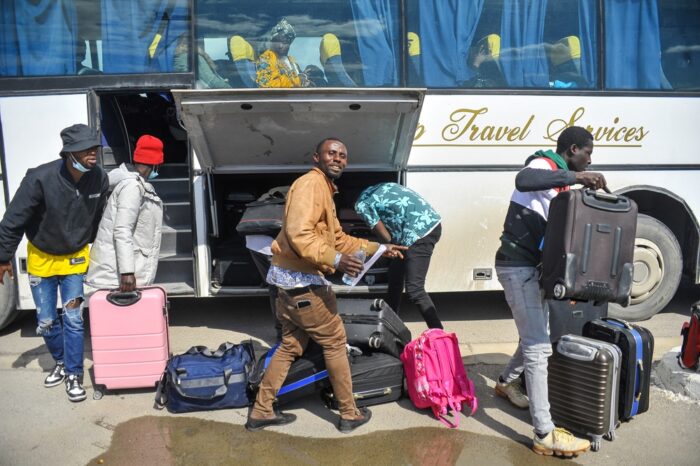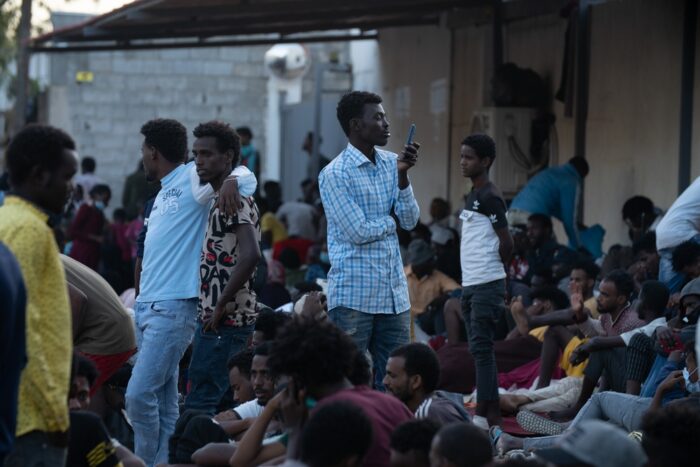Find all related Progressive Post
Progressive Post

On 8 June, the Council of the European Union reached what was branded a ‘historic’ deal on migration. After exhausting negotiations, the majority of the member states’ home affairs ministers voted to unblock the two stickiest chapters of the Pact on Asylum and Migration, thus opening the door to negotiations with the European Parliament. This is undoubtedly a ‘political success’, as the member states have apparently squared the circle in one of the most controversial and divisive policies of the European Union (outvoting the two countries that have most opposed any deal, Hungary and Poland). But can the agreement really be considered a successful achievement in itself?
Or does it just paper over the cracks, without actually bridging the deep divisions among the member states’ different interests or – even worse – without developing a fair and workable migration and asylum system?
It looks, once more, as if the losers will be the people: the migrants, whose well-being, rights and needs will continue to be overruled; and the citizens, who are promised a migration policy that delivers. But that is exactly the question: will this policy deliver? Deliver on what? And at what cost?
After years of deadlock and polarising debates about migration, a broad agreement on reforming European migration and asylum policies now seems to be at hand. And it will probably be achieved, according to plan, within the current parliamentary term and ahead of the 2024 European elections. This development is likely to limit, but not prevent, the instrumentalisation of migration in the upcoming election campaigns. This might have been among the reasons that led certain governments to eventually accept a less-than-ideal agreement. Nonetheless, many observers believe the Pact is doomed to fail because it does not look beyond the limited horizon of short-term, ephemeral and questionable goals, like protecting borders from migrants, and it does not take into consideration the real and long-term interests of all stakeholders, including migrants.
The spirit that informs the Pact, and indeed that has informed the general European approach to migration for years, is that of containing migration, deterring arrivals, controlling external borders, deflecting responsibility (to the peripheral EU member states and to the neighbouring countries) and obsessively trying to resort to returns. In a nutshell, the Pact keeps framing migration as an eternal crisis and emergency, a situation out of control, rather than as a structural issue; migrants as a threat, rather than as people in distress and need; and human mobility as a security issue, rather than an agent of development.
In spite of its consistent approach to migration flow management, however, the European Union has so far failed to cut numbers. “In 2022, around 330,000 irregular border crossings were detected at EU’s external border (…). This is the highest number since 2016 and an increase of 64 per cent from the previous year” – these are data released by Frontex last January, underlining that 2022 “was the second year in a row with a steep rise in the number of irregular entries”. Frontex also reports that numbers are further on the rise in 2023.
Once adopted, the Pact will intensify, not mitigate, this trend, introducing new elements (like the so-called ‘border procedure’) that – despite their declared aim of making procedures smooth – will probably increase the pressure on the peripheral countries of the Union. This comes in defiance of the much-vaunted principle of solidarity, and will only increase the number of people who remain stuck at the border of Europe. It is doubtful, therefore, that the Pact will even deliver on the very goal it openly pursues: curbing numbers. And its ability to deter arrivals is also far from being proven.
What is striking too is that the Pact will not reform the infamous Dublin regulation that has been a bone of contention for years. The principle of first entry – the rule that establishes which country is responsible for assessing the asylum request – will, in fact, remain in force, while the (albeit exiguous) number of total relocations (30,000) on which the EU member states agreed will barely be met. Why should member states comply now, when all the previous attempts to ensure relocations (be they on a compulsory or voluntary basis) have failed?
The Pact is broad, very complex and tortuous. It is therefore easy to become lost in its myriad of details, which will make a preliminary assessment of its impact difficult. However, it is clear that it will not deliver wide measures to open legal pathways for migrants and safe corridors for asylum seekers, nor guarantees that protection standards and human rights will be ensured (while the use of detention will be reinforced). The Pact also fails to take into account the perspectives of the other elements of the equation: the countries of origin and transit, which will have a set of rules imposed on them that they have not contributed to defining.
European migration policies fail – and will always fail – if their goal is to close a migration route for good, and if they intend to turn Europe into a ‘migrant-proof’ fortress. They will also always fail if they aim to waive the EU’s responsibilities by dumping the task of managing migration to Europe onto third countries.
This is because a new (or old) migration route will always be found – possibly more dangerous and deadly than the previous one. These policies will also miss their goal because – despite the formal declarations that always accompany them – they completely fail to analyse, grasp and recognise the complexity of the phenomenon: the many and mixed reasons that drive people’s decision to migrate, the geopolitical dynamics that affect migration trends, and the interests of all stakeholders – including the very same third countries to which the bloc turns for help. These policies even stand against the interests of an ageing Europe to receive migrants.
What is more, EU migration policies will always fail if the bloc, trying to seal its borders, does so at increasingly higher moral costs and at the price of those alleged values that the EU tries, hypocritically, to impose on third countries. And they will fail if they do not consider that, in an increasingly interconnected world, migration management needs to be shaped in the broader context of Europe’s relations with its African neighbours, and in the context of its other policies in the African region. All these elements are unfortunately missing from the Pact.
| Cookie | Duration | Description |
|---|---|---|
| cookielawinfo-checkbox-advertisement | 1 year | Set by the GDPR Cookie Consent plugin, this cookie is used to record the user consent for the cookies in the "Advertisement" category . |
| cookielawinfo-checkbox-analytics | 11 months | This cookie is set by GDPR Cookie Consent plugin. The cookie is used to store the user consent for the cookies in the category "Analytics". |
| cookielawinfo-checkbox-functional | 11 months | The cookie is set by GDPR cookie consent to record the user consent for the cookies in the category "Functional". |
| cookielawinfo-checkbox-necessary | 11 months | This cookie is set by GDPR Cookie Consent plugin. The cookies is used to store the user consent for the cookies in the category "Necessary". |
| cookielawinfo-checkbox-others | 11 months | This cookie is set by GDPR Cookie Consent plugin. The cookie is used to store the user consent for the cookies in the category "Other. |
| cookielawinfo-checkbox-performance | 11 months | This cookie is set by GDPR Cookie Consent plugin. The cookie is used to store the user consent for the cookies in the category "Performance". |
| csrftoken | past | This cookie is associated with Django web development platform for python. Used to help protect the website against Cross-Site Request Forgery attacks |
| JSESSIONID | session | The JSESSIONID cookie is used by New Relic to store a session identifier so that New Relic can monitor session counts for an application. |
| viewed_cookie_policy | 11 months | The cookie is set by the GDPR Cookie Consent plugin and is used to store whether or not user has consented to the use of cookies. It does not store any personal data. |
| Cookie | Duration | Description |
|---|---|---|
| __cf_bm | 30 minutes | This cookie, set by Cloudflare, is used to support Cloudflare Bot Management. |
| S | 1 hour | Used by Yahoo to provide ads, content or analytics. |
| sp_landing | 1 day | The sp_landing is set by Spotify to implement audio content from Spotify on the website and also registers information on user interaction related to the audio content. |
| sp_t | 1 year | The sp_t cookie is set by Spotify to implement audio content from Spotify on the website and also registers information on user interaction related to the audio content. |
| Cookie | Duration | Description |
|---|---|---|
| CONSENT | 2 years | YouTube sets this cookie via embedded youtube-videos and registers anonymous statistical data. |
| iutk | session | This cookie is used by Issuu analytic system to gather information regarding visitor activity on Issuu products. |
| s_vi | 2 years | An Adobe Analytics cookie that uses a unique visitor ID time/date stamp to identify a unique vistor to the website. |
| Cookie | Duration | Description |
|---|---|---|
| NID | 6 months | NID cookie, set by Google, is used for advertising purposes; to limit the number of times the user sees an ad, to mute unwanted ads, and to measure the effectiveness of ads. |
| VISITOR_INFO1_LIVE | 5 months 27 days | A cookie set by YouTube to measure bandwidth that determines whether the user gets the new or old player interface. |
| YSC | session | YSC cookie is set by Youtube and is used to track the views of embedded videos on Youtube pages. |
| yt-remote-connected-devices | never | YouTube sets this cookie to store the video preferences of the user using embedded YouTube video. |
| yt-remote-device-id | never | YouTube sets this cookie to store the video preferences of the user using embedded YouTube video. |
| yt.innertube::nextId | never | This cookie, set by YouTube, registers a unique ID to store data on what videos from YouTube the user has seen. |
| yt.innertube::requests | never | This cookie, set by YouTube, registers a unique ID to store data on what videos from YouTube the user has seen. |
| Cookie | Duration | Description |
|---|---|---|
| COMPASS | 1 hour | No description |
| ed3e2e5e5460c5b72cba896c22a5ff98 | session | No description available. |
| loglevel | never | No description available. |


